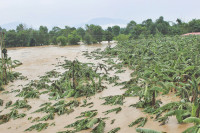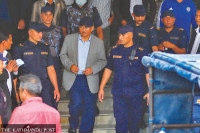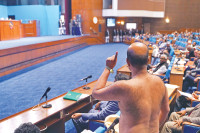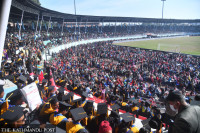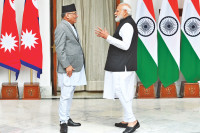Politics
Yearender 2022: Dahal is the new prime minister in Nepal’s tit-for-tat politics
The post-poll alliance surprised all, including Nepal’s close neighbours, China and India.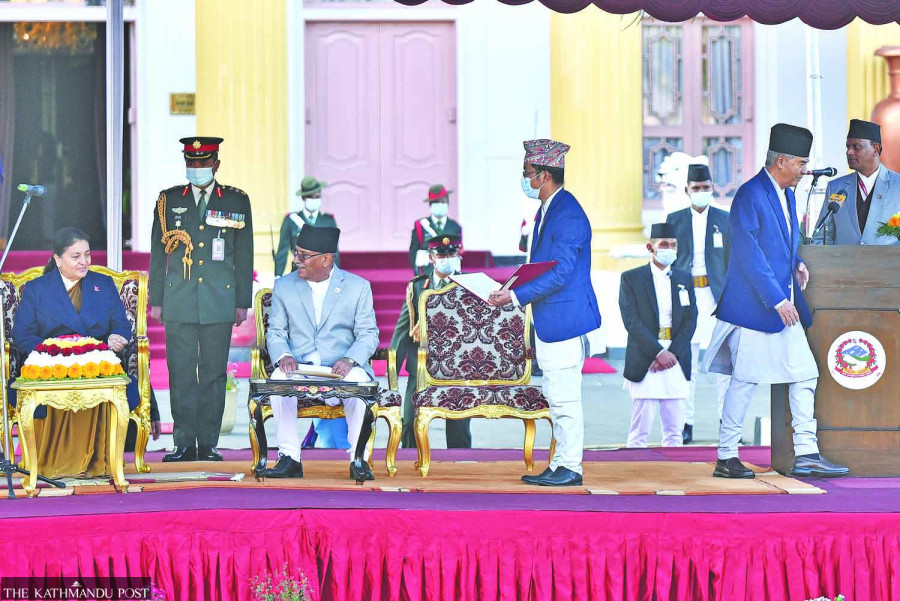
Purushottam Poudel
Pushpa Kamal Dahal was appointed Nepal’s 44th prime minister a few days before the New Year rolled in.
Last week, Dahal walked out of a coalition meeting with the Nepali Congress and into the arms of his fellow comrade KP Sharma Oli, the chairman of CPN-UML, until recently his bete noire.
The post-poll alliance surprised all, including Nepal’s close neighbours, China and India.
With Dahal, the war leader, coming into power, the political headlines about his rift with Oli too ended. But analysts doubt their relationship will last long as Oli too is a power-hungry man.
Dahal, the chair of the third largest party in the federal parliament, has 32 seats. Oli, the leader of the second-largest party, has 78.
The alliance has been developed along with the support of five other fringe parties and three independent candidates.
Nepali Congress, the largest political party with 89 seats, however, was unable to claim the government.
Just a year and a half ago, the Congress-led coalition had tried to overthrow the UML-led administration.
That earlier coalition–Nepali Congress, CPN (Maoist Centre), CPN (Unified Socialist), Janata Samajbadi Party (JSP) and Rastriya Janamorcha Party–was in crisis when Nepali Congress decided to ratify the controversial Millennium Challenge Corporation (MCC) compact, a $500 million American grant project.
However, it remained intact to ratify the compact.
After ratifying the MCC compact, the Congress-led alliance made its presence felt in the local election held on May 13.
But the alliance was finally broken after Dahal took up Oli’s offer to become prime minister again.
“Earlier, in three different instances, the coalition continued because Dahal thought he could get to power by staying in it,” Jalak Subedi, a left political analyst, told the Post. “After the November polls, when Congress president Deuba denied Dahal’s desire to lead the country, the coalition could not continue.”
This was something bound to happen, sooner or later, according to analysts.
Prior to the November election, political analysts had doubted the continuity of the Congress-led alliance given the unpredictable nature of Dahal.
Reportedly, Deuba and Dahal had a gentlemen’s agreement to rotate the prime ministerial position after the November 20 elections.
Before that, the now defunct Nepal Communist Party was founded in May 2018, from the unification of two leftist parties led by Dahal and Oli. Dahal and Oli too had a gentlemen's agreement to rotate the prime ministerial position. Analysts say Oli failed to keep his promise, whereupon Dahal parted ways with him. The Nepal Communist Party, one of Asia’s largest communist parties, split in 2021 due to the personality clash between the two leaders in 2021.
Analysts warn that in tit-for-tat politics, no one will sustain for long.
Dahal’s party held the plurality of seats, 220, following the election of the first Constituent Assembly in 2008. The party, however, failed to rule for more than nine months.
Aside from the first Constituent Assembly election, Dahal’s party has not been successful electorally.
The Maoist party has now been relegated to a distant third position in the parliament.
Despite the downfall, Dahal has twice succeeded in securing the position of prime minister—once in 2017 with the support of the Nepali Congress and most recently with Oli’s help.
It is also curious that the third largest parliamentary party is now leading the government.
Dahal's 10-year armed revolution (1996–2006) promised much to the people.
But, according to analysts, after joining mainstream politics, leaders often forget their words.
Dahal’s new-f0und power has come from the groups he previously referred to as “traditional forces.” In terms of accumulating power, Dahal has long been the unchallenged head of his own party.
He seems keen to make himself the epicentre of politics.
“If we look back at the history of his party, we see numerous instances where Dahal has done just about anything to retain power. And the same pretty much applies to his hunger for the top executive post,” Rajendra Maharjan, a political observer, told the Post.
Mahajan continues, “Dahal is someone who has given up all for power.”
Lekhnath Neupane, a Maoist Centre Central Committee member and a harsh critic of Dahal, sees this tendency as stemming from communist party schooling.
“Generally, in our communist schooling, we are taught to protect our leader,” said Neupane. “If we had the practice of challenging party leadership, then our party would have a different leadership now.”
Dahal’s infatuation with power has damaged his image in and outside the party. He is also often criticised as the unstable character of Nepali politics, Neupane said.
Neupane further said, “Party members dared not confront the leadership. Dahal has taken full advantage of that.”
No one knows for how long though.




 13.12°C Kathmandu
13.12°C Kathmandu

